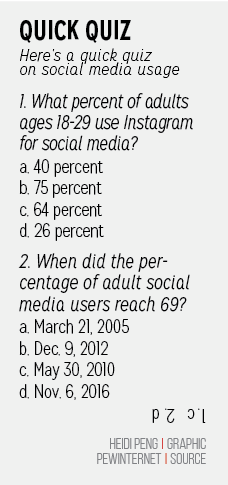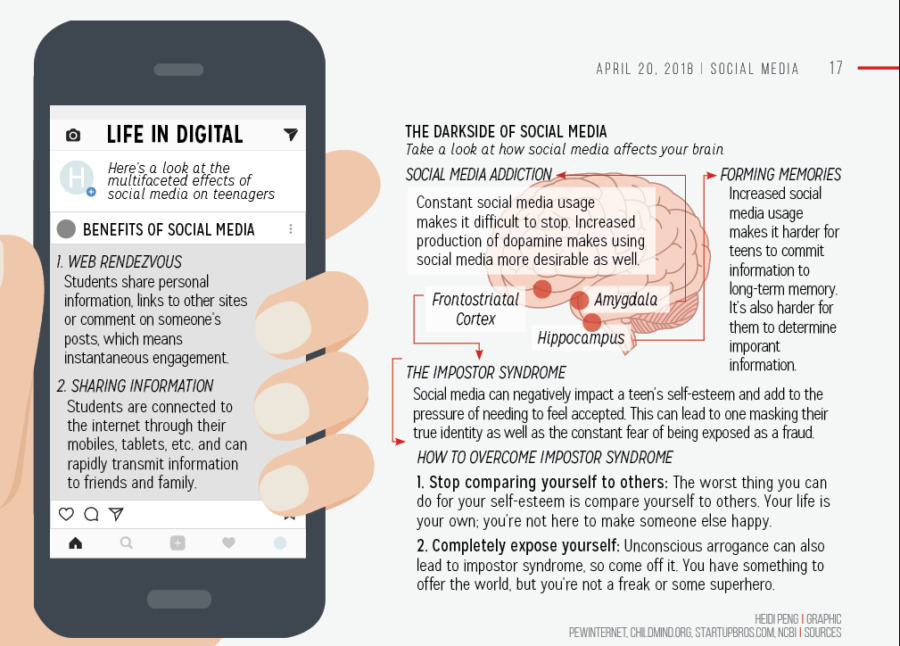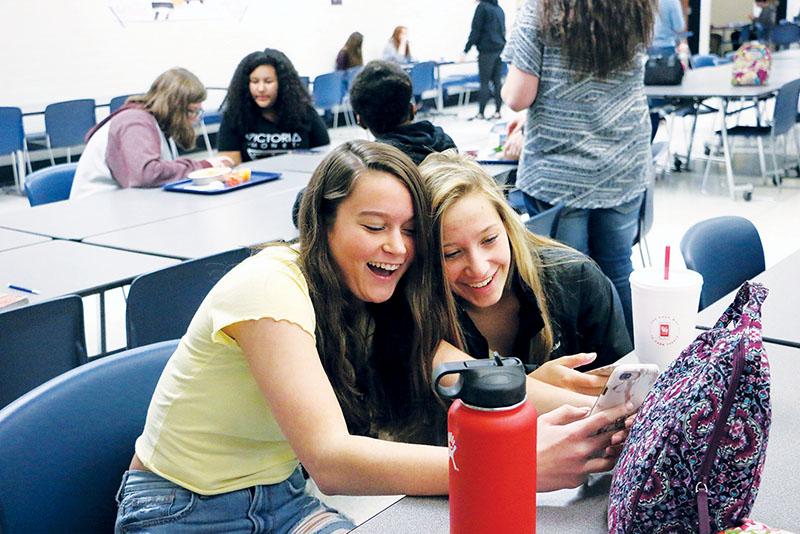Prior to the start of her math class, sophomore Kendall Greene briefly glances at her Instagram feed to remain up to date with ongoing events and incidences in her friends’ and families’ lives. On such social media usage, Greene said she regularly turns to social media for purposes such as establishing connections and engaging in real-world relationships. However, in light of Social Media Safety and Awareness Month being observed this month, she said she believes these positive implications of social media usage are generally overlooked by both people and researchers.
Greene said, “I believe that social media has formed a negative stereotype because many people see teenagers as (part of) what is called the ‘technology generation,’ which I think at times can seem positive but also has formed a large amount of negative stereotypes.”
Greene’s concerns are echoed by an April 2017 meta-study conducted by the Harvard Business Review, which found that although social media use inhibits direct relationships, social media increases sedentary behavior and decreases self-esteem, it has often-overlooked positive implications on well-being by not only fostering real-world relationships, but also increasing support socially.
Likewise, junior Soumya Gupta, who primarily uses the social media platforms Snapchat and Twitter, said she also believes social media has played a pivotal role in keeping her in contact with people who she may not talk to every day.
Gupta said, “I know there can be negative implications, but I personally haven’t been experiencing them simply because I try to regulate my usage. I think the stereotype exists because generally it has a more negative impact but it is not necessarily true because teenagers use social media to keep up with current events. However, I still think it can be easy to get addicted to social media and become dependent on it.”
Psychology teacher Michael O’Toole said although he believes social media encourages connections and interactions among people, its benefits are mainly seen in more long-distance relationships.
“A positive (effect) would be that (since) there are family members who don’t live in my state and I don’t see them very often and through various (forms of) social media, I am able to keep up with them. For example, I (am able to) know someone had a child, or someone is getting ready to celebrate a birthday, so there definitely are connectivity levels,” he said.
Still, despite the existence of positive ramifications in social media, O’Toole said he believes connectivity via social media does not supersede real-life relationships. He also said although there are benefits to its usage, social media does pose significant negative effects that must be taken into consideration.
“Social media is building connections and giving people more interaction, but in reality, it is actually isolating us as a society in a way,” O’Toole said. “Although we are interacting, is it a real interaction? We are finding that there are increased risks to social media usage, such as depression, sadness or an overinflated sense of self since we’re so concerned when we post something about ourselves, things like how quickly did someone else like it, why didn’t they like it if they didn’t, instead of having a general conversation with a person. Social media may connect more people globally, but on a superficial level, opposed to sitting down, taking the time to actually have a conversation with people and actually having meaningful interactions with them, I’m not sure if (social media) can be considered an actual interaction.”
Greene said although she agrees with O’Toole’s view, social media has had an enormous impact on reconnecting with friends and family.
“Social media often distracts me at times when I should be doing more important tasks, which is definitely something negative, as research has shown,” Greene said.
“But, on the other hand, it opens me up to so many people and lets me keep in touch with someone who I don’t (get to) see often. On social media, I have found many people that I used to be close with and I have been able to get back in touch with them.”

































![AI in films like "The Brutalist" is convenient, but shouldn’t take priority [opinion]](https://hilite.org/wp-content/uploads/2025/02/catherine-cover-1200x471.jpg)









































![Review: “The Immortal Soul Salvage Yard:” A criminally underrated poetry collection [MUSE]](https://hilite.org/wp-content/uploads/2025/03/71cju6TvqmL._AC_UF10001000_QL80_.jpg)
![Review: "Dog Man" is Unapologetically Chaotic [MUSE]](https://hilite.org/wp-content/uploads/2025/03/dogman-1200x700.jpg)
![Review: "Ne Zha 2": The WeChat family reunion I didn’t know I needed [MUSE]](https://hilite.org/wp-content/uploads/2025/03/unnamed-4.png)
![Review in Print: Maripaz Villar brings a delightfully unique style to the world of WEBTOON [MUSE]](https://hilite.org/wp-content/uploads/2023/12/maripazcover-1200x960.jpg)
![Review: “The Sword of Kaigen” is a masterpiece [MUSE]](https://hilite.org/wp-content/uploads/2023/11/Screenshot-2023-11-26-201051.png)
![Review: Gateron Oil Kings, great linear switches, okay price [MUSE]](https://hilite.org/wp-content/uploads/2023/11/Screenshot-2023-11-26-200553.png)
![Review: “A Haunting in Venice” is a significant improvement from other Agatha Christie adaptations [MUSE]](https://hilite.org/wp-content/uploads/2023/11/e7ee2938a6d422669771bce6d8088521.jpg)
![Review: A Thanksgiving story from elementary school, still just as interesting [MUSE]](https://hilite.org/wp-content/uploads/2023/11/Screenshot-2023-11-26-195514-987x1200.png)
![Review: "When I Fly Towards You", cute, uplifting youth drama [MUSE]](https://hilite.org/wp-content/uploads/2023/09/When-I-Fly-Towards-You-Chinese-drama.png)
![Postcards from Muse: Hawaii Travel Diary [MUSE]](https://hilite.org/wp-content/uploads/2023/09/My-project-1-1200x1200.jpg)
![Review: "Ladybug & Cat Noir: The Movie," departure from original show [MUSE]](https://hilite.org/wp-content/uploads/2023/09/Ladybug__Cat_Noir_-_The_Movie_poster.jpg)
![Review in Print: "Hidden Love" is the cute, uplifting drama everyone needs [MUSE]](https://hilite.org/wp-content/uploads/2023/09/hiddenlovecover-e1693597208225-1030x1200.png)
![Review in Print: "Heartstopper" is the heartwarming queer romance we all need [MUSE]](https://hilite.org/wp-content/uploads/2023/08/museheartstoppercover-1200x654.png)




